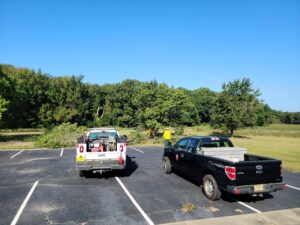Cut Your Bradford Pear Trees Down! The Bounty Is Approaching!
go.ncsu.edu/readext?964961
en Español / em Português
El inglés es el idioma de control de esta página. En la medida en que haya algún conflicto entre la traducción al inglés y la traducción, el inglés prevalece.
Al hacer clic en el enlace de traducción se activa un servicio de traducción gratuito para convertir la página al español. Al igual que con cualquier traducción por Internet, la conversión no es sensible al contexto y puede que no traduzca el texto en su significado original. NC State Extension no garantiza la exactitud del texto traducido. Por favor, tenga en cuenta que algunas aplicaciones y/o servicios pueden no funcionar como se espera cuando se traducen.
Português
Inglês é o idioma de controle desta página. Na medida que haja algum conflito entre o texto original em Inglês e a tradução, o Inglês prevalece.
Ao clicar no link de tradução, um serviço gratuito de tradução será ativado para converter a página para o Português. Como em qualquer tradução pela internet, a conversão não é sensivel ao contexto e pode não ocorrer a tradução para o significado orginal. O serviço de Extensão da Carolina do Norte (NC State Extension) não garante a exatidão do texto traduzido. Por favor, observe que algumas funções ou serviços podem não funcionar como esperado após a tradução.
English
English is the controlling language of this page. To the extent there is any conflict between the English text and the translation, English controls.
Clicking on the translation link activates a free translation service to convert the page to Spanish. As with any Internet translation, the conversion is not context-sensitive and may not translate the text to its original meaning. NC State Extension does not guarantee the accuracy of the translated text. Please note that some applications and/or services may not function as expected when translated.
Collapse ▲The NC Bradford Pear Bounty program is happening in Lee County on Saturday, October 28, 2023, from 9 to 11 a.m.! N.C. Cooperative Extension- Lee County Center is proud to partner with the City of Sanford on their 10-year anniversary of being a Tree City USA to raise awareness about the economic and ecological issues caused by Callery Pears, Pyrus calleryana, and other invasive species in the landscape.
What is the Bounty?
The Bradford Pear Bounty is a tree giveaway program to raise awareness about the invasiveness of Callery Pears and encourage landowners and gardeners to remove them from their landscapes. If you want to participate in the Bounty, you must cut down your Callery or Bradford Pear yourself (or hire someone to!), and take before and after photos. If the tree was not flowering when cut, an additional photo with a close-up of the leaves or bark is required. Register on the Tree Bounty website to reserve your trees and then show up on Saturday, October 28, from 9-11 a.m. at 2420 Tramway Road, Sanford, NC 27332 to get your free trees. It is a one-for-one exchange, up to five trees. Pre-registration is required! Replacement trees are free, native, and offered on a first-come, first-served basis.
But, why should I remove my Bradford/Callery Pears???
Many folks have Bradford or Callery pears in their landscape in the Southeast and love the bright white flower show in the spring. You can drive through Lee County and see countless yards with them flanking the house or anchoring the front yard. They have been in their landscapes for a couple decades and have made their mark on the landscape.

NC Forest Service removing Callery Pears at Extension Center – photo by Amanda Wilkins
We understand that some folks are fond of their trees, but there are serious issues with them now that we have been growing them for several decades.
One of the issues is environmental. The trees were originally released as “sterile” but this has not been the case as more trees and varieties have been released into the trade. The fruits the trees make are eaten by birds and deposited into natural areas, where the trees are not native. The seeds grow into new trees, which usually have nasty thorns, and the roots secrete chemicals that poison the soil for other plants.
The other issue is economics. Land managers and homeowners who never planted the pears have to do extra work to remove these trees before they take hold, or fight them for years after they do! Time is money, and as those of you who have cut down trees know, getting rid of debris is hard work and can be cumbersome to haul off. If someone has a pear in their landscape, they are at risk for the tree splitting as the tree gets older. Callery pears have naturally weak branch angles, meaning as their branches get longer and thicker they are at a higher risk of breaking and splitting. Ask folks who have to deal with them after ice storms or hurricanes! They can also just randomly fail and split without any warning. Watch out where you walk and park your vehicle, if you have a mature Callery pear!
Participate in the Bounty!
It is pretty easy to participate in the Bounty program and you will be doing your part to protect your property and the environment in your community. There are some great alternatives available through the Bounty program and your local N.C. Cooperative Extension Office and Extension Master Gardener volunteers can help you select the best plant for your location!
Here are the Plants Available through the Sanford Bradford Pear Bounty Event
- Pawpaw, Asimina triloba
- River birch, Betula nigra
- American hornbeam, Carpinus caroliniana
- Atlantic white cedar, Chamaecyparis thyoides
- Persimmon, Diospyros virginiana
- White oak, Quercus alba
- Shumard oak, Quercus shumardii
- Bald cypress, Taxodium distichum
- White fringetree, Chionanthus virginicus
- Redbud, Cercis canadensis
- Sourwood, Oxydendrum arboreum
- Serviceberry, Amelanchier canadensis
- American holly, Ilex opaca
- Red maple, Acer rubrum
- Black cherry, Prunus serotina
Resources:




